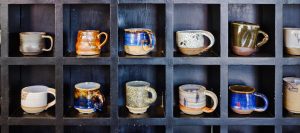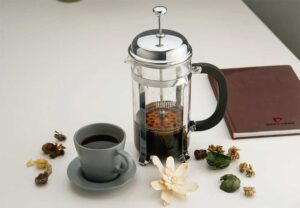If you are a coffee lover, coffee mugs will be an essential part of your tableware. The best material for coffee mugs should be able to keep your brew hot for long, resistant to acid and rust, and still blend well with your kitchen.
Contents
My Top Coffee Mugs Material Recommendations
The best material for coffee mugs doesn’t emit toxic chemicals such as lead and microplastics even under the high temperatures of a hot brew. It also does not react with acidic brews to impart the coffee flavors. The material should be food-grade and BPA-free in its construction.






Best Overall Material for Coffee Mugs: Glass Coffee Mugs

Glass coffee is transparent and gives you an element of sophistication as it allows you to see the layers of your coffee as you drink. The nature of glass makes glass coffee mugs elegant and stylish, enhancing the appearance of your modern kitchen.
Like stainless steel, glass creates air pockets that help maintain the temperature of your coffee for long, allowing you to slowly drink it. The glass that makes coffee mugs are borosilicate, with fewer defects, lead, and BPA free, making it safe for use.
Additionally, glass cannot break under high temperatures, allowing you to serve very hot coffee. In addition, glass doesn’t stain, making glass coffee mugs such as the Sweese Double Walled Insulated Mug Set with Handle, relieving the hassle of immediate cleaning after use.
Unlike Melamine, glass doesn’t release chemicals into your coffee, and so the taste of your coffee remains consistent, whether hot or warm. Although glass is non-porous and easy to clean and maintain, it can easily break, so you must be careful when handling glass coffee mugs.
Pros
- It is BPA free, making glass coffee mugs environmentally friendly and safe for use
- Glass is stain-resistant, which allows you to easily clean with soap and water
Cons
- Its ability to retain heat is less impressive than that of melamine, and your coffee might need reheating
- Glass is delicate and vulnerable to breaking if not handled with care
- SAY HELLO TO SAFE SIPPING - The double-layer glass mugs are made of 100% lead-free mouth-blown...
- ELEVATE YOUR COFFEE EXPERIENCE - Savor the magic of our double-layered mugs! Your drink is suspended...
- GREAT CAPACITY FOR DAILY USE - Each of the glass cups holds 12.5 ounces to the rim, which is large...
Best Dishwasher-Safe Material for Coffee Mugs: Ceramic Coffee Mugs

Ceramics are non-metallic and inorganic solids. Ceramic materials are hard in compression, making ceramic coffee mugs microwave safe if you want to reheat your coffee. The hard compression also makes them dishwasher friendly.
Most coffee enthusiasts will love the high temperatures ceramic can withstand, allowing you to add hot brew without the fear of it chipping. Additionally, they can withstand chemical reactions that occur in other materials such as melamine when subjected to acidic coffee brews.
When you pour hot brew in a ceramic mug such as the Bosmarlin Matte Ceramic coffee mug, it does not absorb flavors from your coffee or release additional chemicals, allowing you to enjoy your drink with optimum flavors.
Like Stainless Steel, they retain the heat of your coffee for longer, relieving you of the hassle of having to top up your coffee for it to remain hot. Also, they properly distribute the heat throughout the coffee. However, ceramic stains easily, and you need to immerse ceramic coffee mugs in soapy water immediately after use to avoid staining.
Pros
- Unlike stainless steel, ceramic does not add external flavors to your coffee
- Ceramic material helps to evenly distribute the heat throughout the coffee, enhancing temperature consistency
Cons
- Ceramic stains easily, giving you the tedious job of bleaching your ceramic coffee mugs
- Ceramic materials cannot retain the heat of a hot coffee like melamine, and overtime, your coffee will cool down
- This mug has a regular capacity(13 oz), which will definitely meet your needs for office and home.
- STURDY & DURABLE: Designed with strong ceramic construction, made of lead-free, cadmium-free, high...
- EASY TO HOLD: Big handle can keep it from rotating when you try to hold the mug, which helps you...
Best Sturdy Material for Coffee Mugs: Stainless Steel Coffee Mugs

Manufacturers apply stainless steel as a coating in copper mugs, making them safe for coffee and other acidic drinks that react with copper. Stainless steel creates air pockets that do not allow heat loss, ensuring that coffee remains hot longer.
Unlike glass, stainless steel finish wears down, and copper can impart bad flavors and odors to your coffee. Also, stainless steel blocks heat from the microwave, which can damage the microwave, making stainless steel coffee mugs not microwave safe like the ceramic coffee mugs.
Stainless is dishwasher safe, so you can hand-wash or dishwash the mugs. Additionally, stainless steel is sturdy and breakproof, allowing the coffee mugs to withstand accidental falls.
Stainless steel has low susceptibility to brittleness at low and high temperatures, enhancing its durability. The sheen-like appearance of stainless steel makes coffee mugs such as the FineDine Insulated Stainless-Steel Coffee Mug with...
Unlike melamine, stainless steel is a combination of chromium, iron, and carbon, which makes your coffee mugs resistant to acids and rust.
Pros
- The air pockets ensure it retains the heat of your coffee for longer
- Like Ceramic, it is sturdy and breakproof, making it ideal for use even by kids
Cons
- Like melamine, it releases some odors under high temperatures, altering the taste of your coffee
- Unlike ceramic, stainless steel is not microwave safe, and you cannot use Stainless steel coffee mugs to reheat coffee
- INSULATED DOUBLE WALL: Keep drinks hot and cold longer for a more for a enjoyable drinking...
- SHATTERPROOF METAL: Constructed of heavy-duty, breakproof stainless steel for durable mugs that are...
- TRAVEL FRIENDLY: These lightweight travel coffee mug each come with a spill-resistant lid for...
Best Coffee Mug Material for Thermal Conductivity: Melamine Coffee Mugs

Melamine is a poor thermal conductor, allowing melamine coffee mugs to retain the hotness of the coffee for longer.
Unlike glass, the poor thermal conductivity of melamine also prevents the coffee mug from becoming excessively hot on the outside, so you don’t have to worry about burning, even if your coffee mug doesn’t have a handle.
Unlike stainless steel, melamine is dishwasher friendly, making cleaning of melamine coffee mugs straightforward. Melamine is a food-grade hard plastic that is BPA-free, ensuring that melamine coffee mugs such as the GET C-107-W-EC Coffee Mugs are safe for use even with the hottest coffee.
However, heating coffee in melamine mugs causes melamine residue to sip into the coffee, posing health issues such as bladder problems, risk of kidney failure, and kidney stones. Unlike Ceramic, melamine can release flavors to your coffee, altering the overall taste of the coffee.
Melamine also stains over time, subjecting you to the tedious task of washing away the stains using dishwasher granules such as cascade. Unlike stainless steel, melamine reacts with acid, so you can’t use melamine mugs with highly acidic coffee brews.
Pros
- It is a good conductor, ensuring your coffee remains hot for long
- Melamine materials are authentically pleasing, ensuring your kitchen remains standard and stylish
Cons
- Unlike Ceramic, it is unsuitable for reheating coffee and may cause health problems if microwaved
- Melamine cannot withstand the chemical reactions of acidic brews
- Package Weight : 1.3 pounds
- SEVERAL APPLICATIONS: Perfect for enjoying hot cocoa, coffee, and teas.
- EASY CLEANING: Toss into the dishwasher for a fast and easy cleaning method
Features to Consider in the Best Material for Coffee Mugs
An ideal coffee mug material should not tamper with the flavors in your coffee or retain odors. When choosing a coffee mug, you should consider the quality of the build material. The table below breaks down these qualities for better understanding.
| Material | Microwave safe | Dishwasher safe | Effect on flavor |
| Ceramic | Microwave safe | Dishwasher safe | Does not impart flavors |
| Stainless Steel | Not microwave safe | Dishwasher safe | Imparts flavors |
| Glass | Microwave safe | Not Dishwasher safe | Does not impart flavors |
| Melamine | Not microwave safe | Dishwasher safe | Imparts flavors |
Thermal Conductivity
Since you will be serving hot coffee, the thermal conductivity of the coffee mug material is an essential factor to consider. This is the ability of your coffee mug to retain its internal temperature without making the outer side excessively hot.

The best material for your coffee mug should keep the handles from heating up, protecting your hands from burns. However, some good thermal conductors, such as stainless steel coffee mugs, feature double-wall insulation, which helps retain the coffee’s internal temperature.
The double walls are separated by air which insulates the cup, ensuring that your coffee retains its heat longer. On the other hand, materials such as melamine are poor thermal conductors, and melamine coffee mugs can keep your coffee hot for long, even without double-wall insulations.
Build Quality
Build quality primarily refers to the sturdiness and how safe a coffee mug material is safe for use. Coffee mugs should use food-grade and BPA-free materials safe for hot drinks and do not alter the taste or impart flavors in your drink.
Additionally, the good build quality should be strong enough to withstand the high temperatures of hot brews and should not react with acidic brews. For instance, Ceramic Coffee Mugs feature a high-quality build of food-grade and BPA-free materials.
On the other hand, stainless steel is a great option due to its sturdiness, making it the ideal material for coffee mugs intended for children.
Typically, stainless steel can withstand accidental falls more than any other material on my list.
Ease of Cleaning
Keeping in mind that you want to drink from a clean mug, opt for a coffee mug material that you clean with a mixture of soap and water or toss it right into the dishwasher. A dishwasher safe should withstand high heat, detergents, and washing sprays without damage.
Therefore, it is advisable to check for a dishwasher symbol, label, or stamp before tossing the mugs in a dishwasher. Additionally, you may need to use a cleaning brush on some materials to reach crannies and nooks to ensure they are spotlessly clean.
The right material should be stain-resistant and not retain odor or impart flavors to your coffee, making it easy to clean. For instance, glass is dishwasher friendly and stain-resistant, making it the easiest material to wash on my list.
Microwave Safe
The cooking surface of a microwave uses glass and ceramic in its construction. A microwave operates by heating water molecules and generating heat through friction.
Microwave safe materials should not heat up directly, even without coffee inside. They should retain heat and should not melt as your coffee heats indirectly, ensuring that your coffee remains safe from harmful chemicals.
However, melamine Coffee Mugs are not microwaved safe and may melt or warp due to the microwave’s heat. Typically, the melamine residues tend to sip into the coffee, causing health problems. On the other hand, ceramic is microwave safe and suitable for heating coffee in a microwave.
Environmentally Friendly
With modern technology, people are becoming conscious of what and how they contribute to the environment and its cleanliness. Environmentally friendly or eco-friendly materials should have less or no damaging effect on the environment.
For instance, stainless Steel Coffee, despite consuming more resources and energy during the production process, is not harmful to the people manufacturing or the surrounding. In most cases, it is because stainless steel is a durable and recyclable material.
On the other hand, materials like melamine are hard plastics that are not eco-friendly. Under certain conditions, these materials might release chemicals that can sip to the soil and negatively impact other living organisms.

Thermal Stress
Thermal stress refers to how different materials deform when subjected to different temperatures. When you serve hot coffee, it will heat up the coffee mug, and depending on the material, the mug might expand or deform.
Deforming can be risky as it might lead to spillage of hot coffee, causing burns. Instead of going for plastics that deform easily, you should consider materials such as melamine, a hardened plastic that can withstand high temperatures without deforming.
Frequently Asked Questions
Can a Coffee Mug Affect the Taste of Coffee?
Yes, coffee mugs can affect the taste and flavor of coffee depending on the construction materials. In most cases, the effect will be more noticeable when serving hot coffee as it has higher chances of causing chemical reactions in the coffee material.
Is a Coffee Mug Tableware?
Yes, coffee mugs are a part of tableware, and the appearance and looks of your coffee mugs should blend well with your tableware and kitchen. Typically, the material and design of your coffee mugs impact how stylish and classy your kitchen is.
Are Ceramic Coffee Mugs Safe?
Yes, ceramic is baked for a prolonged time under high temperatures to reduce the risks of lead leaching into your hot coffee, making it safe. However, serving excessively acidic coffee in ceramic mugs can lead to lead leaching. Therefore it’s not advisable to use acidic coffee with ceramic coffee mugs.
Final Thoughts
The best material for coffee mugs is sturdy, food-grade, and can withstand high temperatures without deforming. The material should be able to keep your coffee hot for long, easy to clean, and blend well with your kitchen design.




